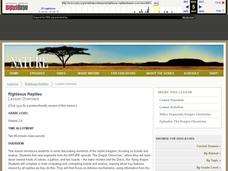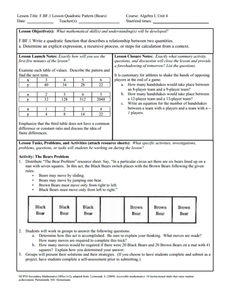Curated OER
More Than a Campground
Fourth graders participate in a class disucssion on the term "habitat". The class brainstorms on what makes a national park special. In small groups, they research a a national park and create a mural depicting those factors that make...
Curated OER
Mushroom Prints
Students create a mushroom spore design on paper while studying the facts on fungi.
Curated OER
The Seed Match
Young scholars study seeds and plants. In this science lesson, students explore seeds from various types of plants and complete a worksheet about seeds. Young scholars discuss plants that are fruits and vegetables and where they grow.
Curated OER
Life Science Review for Grade 4
For this life science review for grade 4 worksheet, 4th graders answer 25 multiple choice questions in standardized test format about life science.
Curated OER
Producers, Consumers, and the Food Chain
Third graders discuss producers, consumers, and the food chain. In this producers and consumers activity, 3rd graders talk about organisms, the food chain, and the difference between producers and consumers. They complete review...
Curated OER
Rainforest Vocabulary Words: Week 1
In these rainforest vocabulary worksheets, read the definitions and the matching terms for the following rainforest vocabulary terms: decomposers, deforestation, epiphytes, extinct, environment, pollute, vegetation, ecology, climate,...
Curated OER
Tree Growth
Students fill in a diagram. In this tree growth lesson, students view a model of a tree, learn how trees grow and explore the layers of a tree. Students complete a diagram where they label the layers of a tree.
Curated OER
Agriculture in Africa: Spotlight on Nigeria
In this African agriculture worksheet, students read a 1-page article about Nigeria's cash crops and then complete a map activity based on the reading.
Curated OER
Wildlife Habitat
Students examine habitats and describe their elements. In this wildlife habitat instructional activity students study the factors that affect habitat and write a short report.
Curated OER
2D Concept Visualization: Cell Organelles Presentation
Students create simple 2D concept driven visualizations of cells and cell organelles and organize them into an effective presentation.
Curated OER
Web of Life
Pupils collect information about various organisms in a forest ecosystem and create a mural that depicts organism interdependence. They then simulate a food web using a ball of string.
Curated OER
Soil Sample Lab
Students test the pH of soil samples they collected from the field trip. In this chemistry lesson, students differentiate acids and bases. They write a lab report about the experiment.
Curated OER
Vermicomposting
Fourth graders explore insect life by viewing a soil presentation in class. In this composting lesson, 4th graders read assigned text about the process of composting soil and the necessity of soil in plant life. Students view video clips...
PBS
Righteous Reptiles
Young scientists write and draw about their knowledge of reptiles. They also view a nature video focusing on lizards and snakes, complete a chart comparing and contrasting them. Next, they focus on the defense mechanisms that they...
Curated OER
Proverbs Matching and Explanation
In this proverbs worksheet, students match the first half of 23 proverbs with the last half. In their own words, students explain what they mean.
Curated OER
Soil and Volcanoes
In this soil and volcano worksheet, students read information about soil and volcanoes and answer questions provided. Students also build model of a volcano and participate in soil activities.
Curated OER
Is It Getting Hot In Here?
Students describe several factors and ways climate change could effect communities. In this climate change lesson students research climate change and complete a worksheet.
Curated OER
The Wonderful Pigs of Jillian Jiggs
First graders compare fictional and real pigs. In this pig comparison lesson, 1st graders read a fiction text then a non-fiction text on pigs. Students complete a K-W-L chart and fill out a Venn Diagram.
Curated OER
Terrestrial Communities
Learners watch a video about different terrestrial communities. They conduct an experiment with sponges conserving water. They research desert characteristics comparing them with other biomes.
Curated OER
Where Are the Dinosaurs?
Students explore what the dinosaurs were like. In this dinosaur lesson, the teacher peaks student curiosity about dinosaurs. This lesson would be a great starting point for a dinosaur unit since it primarily engages student interest and...
Curated OER
This Is Tree-rific!
Third graders view a clip of the video Backyard Safari, "Trees," and portray the life cycle of a tree. They also view a clip on structures of a tree and draw a diagram of a tree in their science journals.
Curated OER
Ocean Microstructure Lesson Plan
Students explore the microstructure of the ocean by analyzing graphs created by Dr. Mike Gregg of the University of Washington Applied Physics Laboratory during the EPIC 2001 research cruise on the Ronald H. Brown NOAA vessel.
Curated OER
The Grass is Always Greener
Third graders experiment with common grass and cellular division.
Curated OER
Bears
Students complete a variety of bear-related activities. They sort and graph teddy bears, distinguish between real and non-real bears and research bear life cycles and habitats.

























